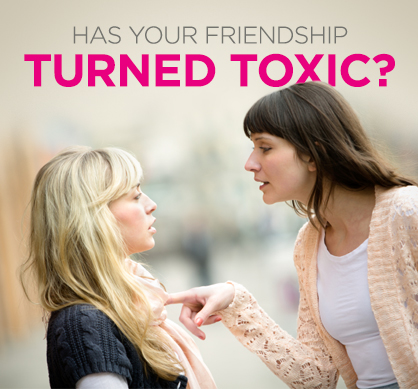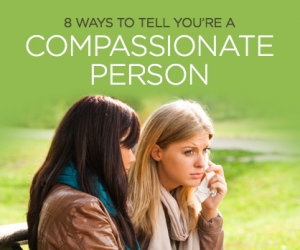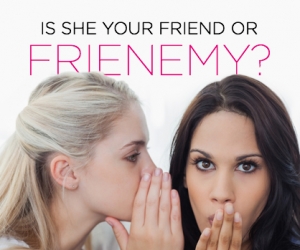Find Out if Your Friendship Has Turned Toxic
Can your friendship can be saved?
Face it. There are some friendships that have run their course. When someone starts to talk about you behind your back, and acts competitive with you, and leaves you with a general sense of unease, then it’s likely time to end the friendship.
But be forewarned – it can be more painful to end a long-term friendship than it is to break up with a boyfriend.
Much like in a romantic relationship, the important thing is to know when it’s time to end it. Our experts share their insights.


Anxiousness and irritability
If a friendship has turned toxic, there is a general sense of anxiousness, irritability and agitation regarding the friend, said Lisa Bahar, a marriage and family therapist.
“There is a sense that the experience with the friend feels off balance, and is emotionally draining. The resentments are increasing, and there is generally a breakdown in communication. There is a sense of feeling out of control and angry and, at times, repressed. If there are substances or eating disorders then they can become the basis of the relationship
If you suspect that your friend is no longer a true friend, then it’s a good idea to talk to an objective individual such as a counselor and sort out your feelings and emotional conflict, Bahar said. “Talking about it with a non-biased person is ideal. Avoid gossiping or seeking validation from others that know the person and yourself, because that can escalate reactions that are not healthy and create more resentment and anger. Setting healthy boundaries, learning how to say no and expressing feelings if appropriate at the time can be helpful. Sometimes, distance to get a clarity check before communicating feelings is more beneficial, but it is case by case,” she said.

Other signs
Dr. Jane Greer, marriage and family therapist and Shrink Wrap media commentator, said, “A friendship has turned toxic when your friend becomes really competitive with you, talks behind your back about you, withholds information from you that previously she would share, etc. If she's behaving in a thoughtless, selfish, uncaring way, you know the friendship has turned toxic.”
If you want to try to salvage the relationship, you can talk to your friend and see if there’s a behavior that’s upsetting her. If the friend apologizes, you may feel like you can forgive them and continue to be friends, but if not, then you may decide you can't be friends any longer, Dr. Greer said.
Tina B. Tessina, Ph.D., psychotherapist, said that breaking up with an important friend can be every bit as painful as breaking up a love relationship. But, there are sometimes good reasons to break up, and other times when breaking up is not really necessary.
If you feel a lot of guilt about the friendship, and you wind up doing things you don't really want to do, or paying for things you didn't want to pay for, you may have a manipulative friend, one who uses emotional blackmail to get what he/she wants. Keep in mind this friend probably doesn't really understand what he/she wants, these things are deeply ingrained behaviors that usually come from a dysfunctional childhood. They indicate emotional immaturity.
Here are the signs of emotional blackmail and what to do about them:
A demand. Your so-called friend (SCF) won't take no for an answer, and requests are really demands. If there's a price to pay (your friend bad-mouths you to others, throws temper tantrums, has crying fits, or pouts) when you don't say yes, understand that the more you give in the bigger the penalties get. Nip this in the bud as soon as possible, by saying, “I'm sorry you're upset, but the answer is still no.” If your friend's case of entitlement is big, you might have to stop saying yes to anything and leave the friendship.
Resistance. The SCF turns every discussion into an argument. It's important to this friend to be right all the time, even when he/she is clearly wrong. Just stop talking when this happens. You'll never change the mind of someone like this, and you don't want to endorse the error, so just clam up. Completely. This is very effective.
Pressure. Your SCF pressures you to go along. This is related to not taking no for an answer. Your friend cajoles, pleads, or makes an argument for why you should do something “I know you've been sober for years, but just have one beer with me. It's my birthday.” “Oh, c'mon, it'll be fun.
Threats. Your SCF uses threatening or coercing tactics: threatening to end the relationship, tears, rage, badgering. “If you don't do what I want, I'll…” is a threat. Emotionally, it's the equivalent of pulling a knife. Threats have no place in a friendship. If a threat happens, leave. Right away. No explanation. Just leave, and sort it out later. You want to send a clear message that threats are not okay.
Gossip. Your SCF says unpleasant things about you to other friends. This is a tactic designed to make you feel “less than” your friend, to give the other person power over you. There's no point in even telling your friend that it's a problem. You can talk about it the first time, but if it keeps happening, you have to recognize that this is no friend, and act accordingly.
Your friend may be teachable
Tessina said that some friends might be able to be “fixed.” If you have a friend who is always whining or late for lunch, it’s problematic but can be resolved. “Let her know what you like about what she does, then she'll hear you when you say you don't like something. Use silence: if you don't like what she's doing or saying, don't respond—she'll get the message, without a word.
It’s also important to set limits. If she's habitually late, make sure she knows when the timing is important (you hate to miss the first 5 minutes of the movie) and when time is not an issue (you can read a book or talk to a friend until she arrives). When timing is important, tell her if she's not ready by a certain time, you'll leave without her. It's amazing how well that works. Don't be too strict about it—if she has a good reason, or it's only occasional, cut her a little slack. But, don't be a pushover, either.
Tagged in: relationships, friends, conflict, toxic friendship,



